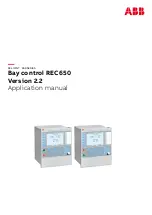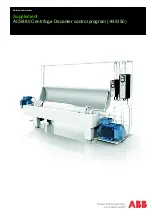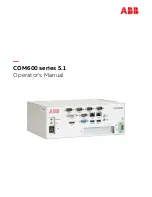
Hardware Manual for the PCD2.M5 Series│Document 26/856; Version EN 12│2014-07-24
Saia-Burgess Controls AG
Memory space on the PCD
PCD2.M5_ Classic CPUs and expansion housings
3-39
3
Storing a text/DB on the flash card with SYSWR K 3000
Storing a text/DB on the onboard flash with SYSWR K 3100
Instruction:
SYSWR K 3x00
1)
K number
; address of the texts/DBs as
; K constant or in a register,
; existing text/DB
; addresses in the range >= 4000
; may be used
1) Alternatively, the value 3x00 can be passed in a register.
Battery status after execution:
low:
the text/DB has been saved, and the flash card is ready
for new SYSWR instructions
high:
the last instruction was not processed to completion;
before further SYSWR K 3x0x instructions, a SYSRD
K 3x0x must be executed to check the readiness of the
flash card
When using the instruction SYSWR K 3x00, note the following:
● After any change of memory configuration, a “backup user program to flash” must
be run, to ensure that the “backup DB to flash” will work (partitioning the flash).
● The flash card can be written to a maximum of 100,000 times, so it is not permis
-
sible to invoke the instruction in a cyclical manner or at short intervals.
●
It is strongly recommended to execute a SYSRD K 3x00 before this instruction, to
test whether the flash card is available and ready.
●
The processing time for the instruction may be up to 100 ms. At that point, there
is no guarantee that all of the text/DB has been written (the process will continue
in background). For this reason, the instruction must not be invoked in XOB 0
(XOB for a power failure) or during time-critical processes.
● If errors occur during processing, XOB 13 will be called where it is present, or the
error LED will be set
●
When starting the PCD after a loss of RAM memory, the state of the texts/DBs
after the last download is restored, even where the SYSWR K 3x00 instruction
has been used to store newer versions.
●
Within the maximum number of write cycles, a text/DB can be stored any number
of times, without the flash card becoming over-full.
















































